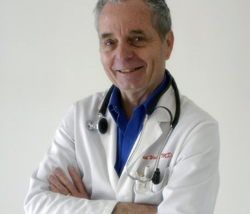For whatever reason, it’s been noted that medical students generally experience diminished interest in the humanistic aspects of medicine during their education.
This fact may diminish a student’s capabilities as a physician, said David Watts, M.D., the presenter of today’s Wilson lecture, which starts at noon in the Sorrell Center, Room 3002.
Increased exposure to literature, prose and poems may help remedy these symptoms in medical students, said Dr. Watts, a gastroenterologist at the University of California-San Francisco and author of the books “The Orange Wire Problem” and “Bedside Manners.”
 |
David Watts, M.D., will present the annual Wilson lecture today at noon in the Sorrell Center, Room 3002. Dr. Watts — a gastroenterologist at the University of California, San Francisco and also the author of two books of stories — will discuss how exposure to literature and poetry can help medical students. |
In his lecture today, Dr. Watts will give several examples of how literature can translate humanistic experiences in such a way that readers actually feel as though they have experienced them, too.
He also will discuss how being exposed to this translational effect can benefit health care professionals.
The Wilson lecture is sponsored by the Charles Wilson, Humanities in Medicine Program.
Charles Wilson, M.D., is a former UNMC clinical professor and a former University of Nebraska Regent.
He has long encouraged health care professionals to learn humanities — his own story serving as an example. Dr. Wilson dropped his pre-med major to study art, literature, music and other humanities — much to the chagrin of his undergraduate counselor who said, “Mark my words, young man. You will never get into medical school.”
Dr. Wilson received his M.D. from Northwestern University in 1964.